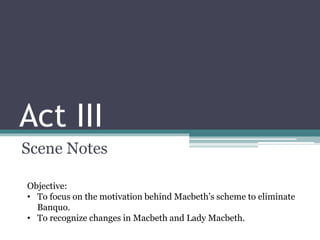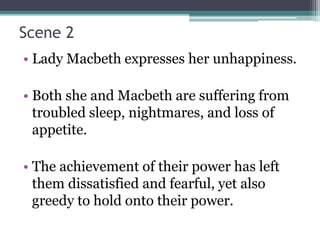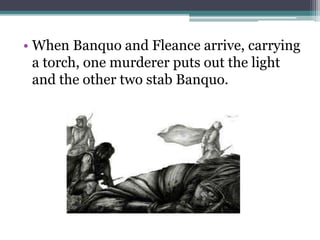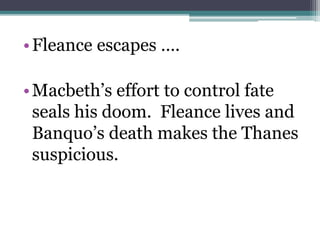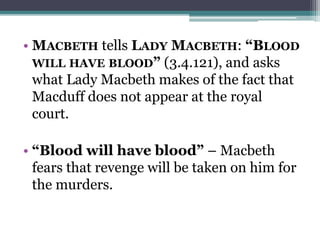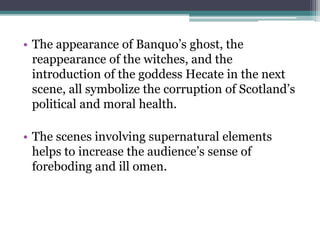Macbethactiiinotes 130410085839-phpapp02
- 1. Act III Scene Notes Objective: • To focus on the motivation behind Macbeth’s scheme to eliminate Banquo. • To recognize changes in Macbeth and Lady Macbeth.
- 2. Do Now: • What would Macbeth and Lady Macbeth have to do to gain peace of mind?
- 3. Scene 1 • In Act III, scene 1, we see Macbeth, the new king of Scotland. • He should be happy but instead is preoccupied with anxiety about Banquo, who perhaps knows too much, and whose descendants may one day be kings. • Macbeth coolly plots more murders, this time using assassins. He manipulates the assassins by ______________________________.
- 4. • What do Lady Macbeth and Macbeth express in these lines? (scene 2) • “Nothing’s had, all’s spent, / Where our desire is got without content” (Lady Macbeth, line 4-5). • “O, full of scorpions is my mind, dear wife!” (Macbeth, line 36).
- 5. Scene 2 • Lady Macbeth expresses her unhappiness. • Both she and Macbeth are suffering from troubled sleep, nightmares, and loss of appetite. • The achievement of their power has left them dissatisfied and fearful, yet also greedy to hold onto their power.
- 6. • The balance of power in their relationship has shifted, with Macbeth assuming more dominance in planning. • Both remain committed to duplicity, with “faces vizards to our hearts, / Disguising what they are” (p. 106, lines 34-35).
- 7. • They are determined to hide their agitation and to be welcoming and jovial at the banquet.
- 8. • Macbeth hints to Lady Macbeth that he has made plans for some significant action, but refuses to give her any details. • “Be innocent of the knowledge, dearest chuck, / Till thou applaud the deed” (Macbeth, line 45).
- 9. •In order to keep power built by violence, more violence is always needed. Macbeth knew this would happen … •He’s caught in the vicious cycle of evil.
- 10. •…and that vicious cycle begins to take a toll on Macbeth. •Macbeth tries to protect Lady Macbeth: traditional male – female roles.
- 11. The two murderers lie and wait a mile from the royal castle. A third murderer joins them, sent by Macbeth. Scene 3Objective: To recognize the importance of this scene as a turning point in the play.
- 12. • When Banquo and Fleance arrive, carrying a torch, one murderer puts out the light and the other two stab Banquo.
- 13. •Fleance escapes …. •Macbeth’s effort to control fate seals his doom. Fleance lives and Banquo’s death makes the Thanes suspicious.
- 14. • The murder of Banquo marks the height of Macbeth’s success, but the escape of Fleance marks the turn of fortune against Macbeth. • The scene is swift and brutal.
- 15. Objective: • To focus on the significance of the appearance of Banquo’s ghost.
- 16. Do Now • Act 3.4 - • Before Banquo’s fatal ride, Macbeth reminded him not to miss that evening’s feast. Banquo’s response, “My lord, I will not,” is an example of Shakespeare’s irony, as the ghost takes Macbeth’s place at the table and shakes its blood covered head at him.
- 17. Scene 4 • Macbeth bids all the lords welcome to the feast. • He then notices that one of the murderers is standing at the door. • The murderer tells Macbeth that Banquo is dead but Fleance has escaped.
- 18. • Macbeth comforts himself that Fleance will not be a threat for quite some time. • Macbeth learns that his first attempt to control fate has failed.
- 19. • Lady Macbeth calls to Macbeth and asks him to return to the feast and sit. • But Macbeth doesn’t see an empty seat at the table.
- 20. • When Lennox gestures at a seat, saying it’s empty, Macbeth sees BANQUO’S GHOST sitting there.
- 21. • Macbeth alone can see the ghost. • He astonishes the thanes by shouting at the empty chair. • Macbeth’s bizarre behavior puzzles and disturbs his subjects, confirming their impression that he is mentally troubled.
- 22. • Is Banquo’s ghost real or a figment of Macbeth’s guilty mind?
- 23. • The uncertainty emphasizes that Macbeth’s fate is part of him, caused by his character, his ambition, and his guilt.
- 24. Banquet scene… • The contrast between this scene and the one in which Duncan’s body was discovered is striking – whereas Macbeth was one cold-blooded and sure footed, he now allows his anxieties and visions to get the best of him.
- 25. • Lady Macbeth covers for him. • She pulls Macbeth aside and once again questions his manhood. • “Are you a man?” (line 59). • “What, quite unmanned in folly?” (line 75). • The ghost disappears.
- 26. • Macbeth and Lady Macbeth continue to try to lie to keep their secrets and hold on to power, but these lies become less and less effective as guilt about the violence they have committed begins to affect them.
- 27. • Macbeth has become so warped he cannot tell the unnatural from the natural anymore. • Lady Macbeth sees lying is useless and chooses isolation: she tells the thanes to leave.
- 28. • MACBETH tells LADY MACBETH: “BLOOD WILL HAVE BLOOD” (3.4.121), and asks what Lady Macbeth makes of the fact that Macduff does not appear at the royal court. • “Blood will have blood” – Macbeth fears that revenge will be taken on him for the murders.
- 29. • Macbeth’s desperation to keep power motivates him to visit the weird sisters. • He has sacrificed everything for his ambition… • He says: “I am in BLOOD / Stepped in so far” (3.4.135) that turning back is as difficult as continuing on.
- 30. • … now ambition and violence are all he has left, and he knows it.
- 31. • The appearance of Banquo’s ghost, the reappearance of the witches, and the introduction of the goddess Hecate in the next scene, all symbolize the corruption of Scotland’s political and moral health. • The scenes involving supernatural elements helps to increase the audience’s sense of foreboding and ill omen.

